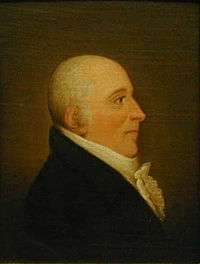Joseph Quesnel
Joseph Quesnel (15 November 1746 – 2 or 3 July 1809) was a French Canadian composer, poet, playwright and slave-trader. Among his works were two operas, Colas et Colinette and Lucas et Cécile; the former is considered to be the first Canadian opera.[1][2]

Early life and education
Quesnel was born in Saint-Malo, France, the third child of Isaac Quesnel de La Rivaudais (1712-1779), a prosperous merchant, and his wife Pélagie-Jeanne-Marguerite Duguen.[3] He studied at the Collège Saint-Louis (1766).
Life and career
Quesnel joined the French merchant marine and sailed to Pondicherry and Madagascar, travelled in Africa, and the Caribbean.[4] He engaged in the Atlantic slave trade. In 1768, as a second-lieutenant on board the Mesny, he sailed to Cabinda (modern-day Angola) where 514 "Blacks of all ages" were purchased and taken to modern-day Haiti where they were sold, according to French archival sources quoted in a novel about him.[5] He carried with him his violin and read the works of French playwrights.[6]
In 1779, Quesnel sailed for New York in command of a French warship which was captured by the British.[7] Quesnel was taken to Halifax, Nova Scotia and allowed to settle in Boucherville, near Montreal, Quebec.[3][8][6] He married Marie-Josephte Deslandes there and became partners in business with Maurice-Régis Blondeau, his mother-in-law's new husband. He became wealthy by trading in slaves.[9][10]
Quesnel published a number of theatrical works, including Colas et Colinette, which was written in 1788 and first performed in 1790,[7] and Lucas et Cecile;[11][12] he also wrote poetry; his best known poem was titled "L'Épître à M. Labadie".[13]
Besides several songs, he composed sacred music for the parish church of Montreal,[6] and some motets, and wrote a short treatise on the dramatic art (1805). He founded and was part of the troupe of Montreal's Théàtre de Societé.[14][15][8]
He died of pleurisy at Montreal in 1809 several months after he had dived into the Saint Lawrence River to save a drowning child.[16]
Quesnel was the subject of the comic opera Le Père des amours, written by Eugène Lapierre in 1942.
Family
Quesnel's son Jules Maurice Quesnel travelled with Simon Fraser on his journey to the Pacific Ocean; the town of Quesnel, British Columbia is named for him. Another son Frédéric-Auguste became a lawyer and politician; his daughter Mélanie married lawyer Côme-Séraphin Cherrier.
Works
- Colas et Colinette, a vaudeville (1788)
- Lucas et Cecile, an operetta
- L'Anglomanie, a comedy in verse[17]
- Républicans Français, a comedy in prose, afterward published in Paris
- "L'Épître à M. Labadie" - poem
See also
References
- "Canadian Songs for Parlour and Stage". Carleton University. Ottawa, Ontario, Canada.
- Helmut Kallmann (25 May 2013). Mapping Canada’s Music: Selected Writings of Helmut Kallmann. Wilfrid Laurier Univ. Press. pp. 50–59. ISBN 978-1-55458-892-3.
- Leonard E. Doucette (1984). Theatre in French Canada: laying the foundations, 1606-1867. University of Toronto Press. p. 52. ISBN 978-0-8020-5579-8.
-

- Arseneault, Michel (2012). Méfiez-vous des poètes. Montreal: Fidès. pp. 32, 44, 74. ISBN 978-2-7621-3120-8.
- William White (1890). Canadiana. 2. Gazette Print Company. p. 22.
- The Sonneck Society Bulletin. The Society. 1993. p. 58.
- MusiCanada. Issues 17-29. The Centre. 1969. p. 18.
- University of Ottawa. Centre de recherche en civilisation canadienne-française (1970). Bulletin du Centre de recherche en civilisation canadienne-française, Université d'Ottawa. Centre de recherche en civilisation canadienne-française, Université d'Ottawa. pp. 22, 59.
- Frank Mackey (1 February 2010). Done with Slavery: The Black Fact in Montreal, 1760-1840. MQUP. pp. 439, 539. ISBN 978-0-7735-8311-5.
- Maurice Lemire (1991). La vie littéraire au Québec: 1806-1839 : le projet national des Canadiens. Presses Université Laval. p. 351. ISBN 978-2-7637-7282-0.
- Opera Canada. 9–11. Canadian Opera Association. 1968. pp. 32, 79.
- Robin Elliott; Gordon E. Smith (19 April 2010). Music Traditions, Cultures, and Contexts. Wilfrid Laurier Univ. Press. p. 230. ISBN 978-1-55458-199-3.
- Daniel Mendoza de Arce (2006). Music in North America and the West Indies from the Discovery to 1850: A Historical Survey. Scarecrow Press. p. 119. ISBN 978-0-8108-5252-5.
- Guy Beaulne (1976). Le Théâtre canadien-français: évolution, témoignages, bibliographie. Fides. pp. 62–63. ISBN 978-0-7755-0583-2.
- Contemporary Canadian Composers ed. by Keith MacMillan and John Beckwith. Toronto : Oxford University Press, 1975
- Littérature canadienne (1848). Le répertoire national ou recueil de littérature canadienne, compilé et publ. par J. Huston. pp. 7–8.
External links
- Canadian Theatre Encyclopedia
- Biography at the Dictionary of Canadian Biography Online
- Entry from the Encyclopedia of Music in Canada
- Fonds Joseph Quesnel (R5990) at Library and Archives Canada
- Colas et Colinette ou le Bailli dupé, comédie-vaudeville by Joseph Quesnel. file (R12428) at Library and Archives Canada. The file contains an annotated copy of the piano-vocal score (65 p.) and a text concerning the reconstruction of the work by Godfrey Ridout.